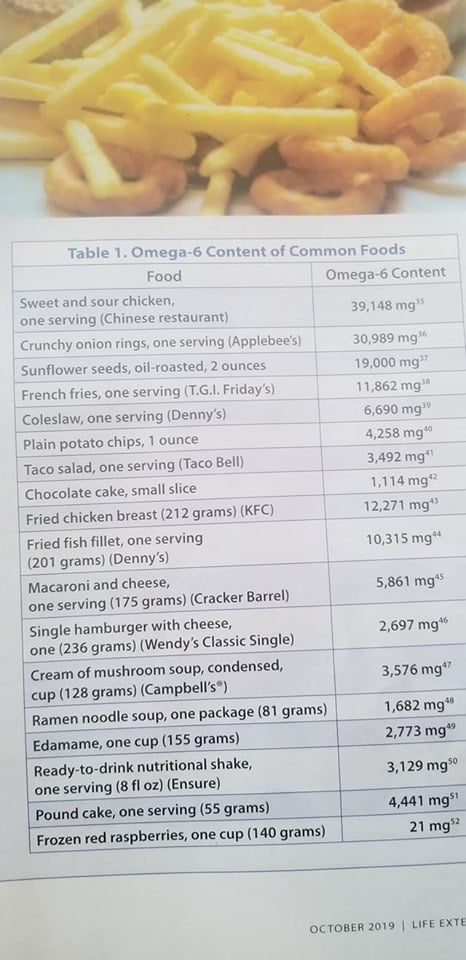
Chronic systemic inflammation and omega 3 deficiency
That’s right, chronic inflammation is common. Chronic systemic inflammation and omega 3 deficiency are strongly linked. Inflammation is a commonality with many diseases. Why do we have so much inflammation these days?
This week Dr Curt shared some information on the topic.
According to Dr Curt, omega 6 fats cause chronic low grade inflammation in our bodies when the fat is out of balance with the omega 3 fats.
Below is a chart showing the amounts of common fast foods. Sweet and sour chicken for example. One serving gives 30,000 mg of omega 6. That can trigger a huge degree of inflammation if combined with a regular diet consisting of other omega 6 containing foods.

Scientists have shown us we need to balance that omega 6 with omega 3 at a ratio of 4:1. The standard American diet has a ratio closer to 16:1.
The ratio is suggested to be 4:1 omega 6:omega 3. That means for every 100 milligrams of omega 6, we need to consume 25 milligrams of omega 3.
Most people (probably not just Americans) consume omega 6 at a ratio of 16:1 with their omega 3 oils. That’s not good at all. Omega 6 fats are necessary for life but trigger inflammation when at this ratio. Chronic inflammation will cause arthritis, allergies, heart disease, cancer, strokes, dementia, as well as many other diseases.
That’s devastating.
If for example, you were to eat hot wings cooked in a deep fryer then your omega 6 levels would go sky-high. In order to help create the balance you need to consume more omega 3 fats.
For every ounce of omega 6 fats you need a quarter ounce of omega 3.
So what’s the deal if you eat meat? If a cow consumes a diet of corn, they will have an overabundance of omega 6. It’s not balanced.
If you eat wild deer, buffalo, and elk meat or other wild meat. Then these animals eat corn and grain in certain areas, but they also graze on leaves, bark, nuts, berries in the wild. These foods they consume create a fat balance in their bodies. When consumed by us, it creates a balance of good omega fat ratio.
It’s a well known fact the standard American diet is not healthy. Let’s look at good fat vs bad fat for a second. On the chart above you’ll notice the amount of omega 6 found in certain common foods.
Again, proper ratios are 4:1. So if you eat a fried chicken breast at KFC, or a fried fish fillet at Denny’s, French Fries at TGI Fridays, or 2 servings of mac n cheese, you’ll need 2500 mg of fish oil.
The product Dr Curt uses is Sisel Supra Omega. It has 1000 mg of fish oil per serving. Curt says, “I typically take one dose but if I go out to eat, I’ll take 2-3 doses. If you eat the foods I mentioned above, you’ll need 2.5 servings of our fish oil.
That’s 8 capsules.
If you eat one serving of sweet and sour chicken or an order of onion rings, you’ll need to take that times 3! That’s right, 24 capsules of fish oil to balance just this one meal! Holy Cow! No wonder we’re all sick. Most people consider fish or chicken to be healthier than that.
Here’s the deal, restaurants cook in the wrong oils. You can cook at home and eat healthily, you just need to start being aware.
Sisel offers the very best supplements I’ve ever used. There’s a handful of brands that are good, but most don’t meet the high-quality standards I recommend.
A friend of mine takes a cheap version of L Arginine. It’s got some recommendations that make people think they have a high-quality supplement, but when Nitric Oxide levels were tested, he didn’t make the cut. I did. Nitric Oxide helps to keep your arteries healthy. That supports the body to help lower blood pressure as well as lowering your risk of certain disease.
4 Restore is the product of choice for me!! Again, it’s from Sisel.”
So what are the best dietary sources of Omega-3 Fatty Acids
The body can manufacture many of the fats it needs from other fats or raw ingredients. Omega-3 fatty acids, by contrast, are considered essential fats, meaning that you can only get them from foods that contain them.
These include:
- Fatty fish, such as salmon, tuna, mackerel, sardines, anchovies
- Flaxseeds and flaxseed oil
- Nuts, especially walnuts
- Avocados
- Certain dark, leafy greens (such as kale, spinach, purslane, collard greens, mustard greens) Ref
We don’t eat enough Fish
“Fish contains two omega-3 fats. There’s good evidence that consuming these “marine” omega-3s lowers the risk of heart disease and perhaps some other conditions as well.
But if you are worried about declining fish stocks then it is well-founded. Many are already in trouble, and if everyone were to eat the recommended amount of fish, which is about seven ounces per week, the harvestable fish supply couldn’t meet the demand.” Ref
Furthermore, consumption of certain Fish are restricted due to the high mercury content. Here are the government guidelines for fish consumption.
It is such a worry and seems unfair we have to restrict consumption due to mercury contamination. I would eat tuna 4 times a week if it was safe to do so. Therefore I only eat it once a week.
Another reason to supplement. If you are taking a high-quality supplement then it has gone through a testing and filtering process. This ensures mercury is not present. I trust Sisel as they are very strict about screening ingredients for contamination.
Research Supports Supplementation of Omega-3 Supplements
Recent research from NTNU supports previous discoveries, and has also found new, useful effects of omega-3 supplements and how these lipids dampen harmful inflammatory reactions in the body. Ref
So it seems there is plenty of supporting information that chronic systemic inflammation and omega 3 deficiency are linked.
In conclusion, few people are eating fish regularly as well as nuts and green vegetables. Conversely, we are consuming the wrong types of fats which essentially gives us a double whammy effect.
Combined with other great nutrition, you can lower your omega 6: omega 3 ratio and decrease your chronic inflammation. Change your diet that is the most important thing you can do.
I like to Add omega 3 fats. Take good nutritional supplements is something to consider. Supra Omega is an excellent choice as it contains vitamin D3 and crystal-free CoQ10 with a broad mega-mix of essential omega fatty acids-3, 5, 6, 7 & 9.
According to research dietary changes you will lower your risk of inflammation and improve your health.
Last Updated on March 27, 2023 by Katie Sisel Distributor

